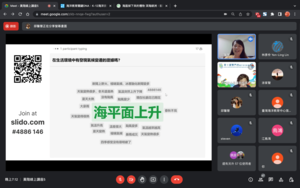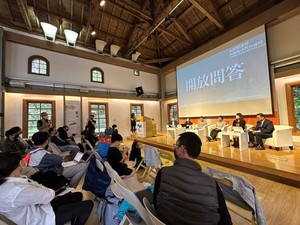2022 Yellow/Advanced Level Marine Educator Training Program


Project Assistant:CHANG,WEI-LUN
In line with the national 2050 Net-Zero Emissions policy, the 2022 Yellow/Advanced Level Marine Educator Training Program adopted “Climate Change and the Ocean” as the theme of discussion. Five experts were invited to participate in the discussion, namely Honorary Distinguished Professor Hsing-Juh Lin from the Department of Life Sciences, National Chung Hsing University; Associate Professor Shiau-Yun Lu from the Department of Marine Environment and Engineering, National Sun Yat-sen University; Associate Professor Ting-Kuang Yeh from the Institute of Marine Environmental Science and Technology, National Taiwan Normal University; Li-Shu Chen, head of the National Museum of Marine Science and Technology’s Industry–Academia Partnership division; and Hsing-Hui Chiu, a teacher from Tainan Municipal Simen Experimental Elementary School.
The program involved open activities, namely five online lectures and one seminar, through which teachers and the general public could learn about topics related to climate change and marine education. The first online lecture was conducted by Professor Yeh, who discussed the scope and coping strategies for marine and climate changes and shared his experience in guiding students in demonstrating proenvironmental behavior. Next were the lectures of Professor Lin, Professor Lu, and Dr. Chen, who discussed coastal blue carbon, costal impact, and biodiversity, respectively. These lectures addressed the three core aspects of climate change, namely scientific evidence, mitigation, and adaptation. In addition to sharing their knowledge, the experts also provided suggestions for teaching activities. The last online lecture was conducted by Ms. Chiu, who provided an overview of available teaching resources for marine and climate changes and shared her practical experiences as a teacher.
The seminar was held in-person and also streamed online to solicit public interest. Profs. Lin and Lu began with discussing ocean acidification and the ecological impact of and coping strategies for sea level rise, two of the greatest ocean-related effects of climate change. Subsequently, Professor Yeh introduced theories of scientific education, Ms. Chen described scientific inquiry and practice and the teaching resources available worldwide, and Ms. Chiu discussed how real-world problems could be transformed into teaching materials for school-based education. The second half of the seminar was a Q&A session, in which the experts responded to questions raised by the audience; the questions were mainly related to the establishment of core competencies for marine education in the context of climate change and methods for solving practical teaching problems.
Through these public activities, we identified the public concern for marine education in the context of climate change. These data can provide a basis for discussion of subsequent Yellow/Advanced Level Marine Educator Training Programs, in which educators continue to discuss the country’s marine education and suggest directions for its overall development. Through the power of education, we can advocate sustainable development, extending this concept from the preservation of our oceans to that of the whole Earth.

